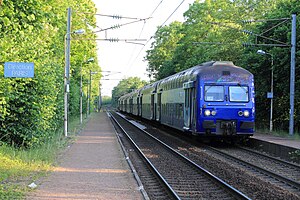Voiture de banlieue à 2 niveaux
| VB 2N | |
|---|---|
 VB 2N at Lavilletertre station in 2011. | |
 Lower floor of a renovated VB 2N. | |
| Manufacturer | CIMT / ANF |
| Replaced | Voiture État à 2 étages, Z 5300 |
| Constructed | 1974–1984 |
| Refurbished | 2002–2008 |
| Scrapped | 2021– |
| Number built | 589 |
| Successor | Z 50000, Regio 2N, RER NG |
| Operators | SNCF |
| Specifications | |
| Car length | 24.28 m (79 ft 8 in)[1] |
| Width | 2.856 m (9 ft 4.4 in)[1] |
| Height | 4.32 m (14 ft 2 in)[1] |
| Maximum speed | 140 km/h (87 mph) |
| Track gauge | 1,435 mm (4 ft 8+1⁄2 in) standard gauge |
The Voiture de banlieue à 2 niveaux (English: two-deck commuter car), shortened to VB2N, is a type of double-deck passenger railcar used on Transilien, the commuter rail network in the Île-de-France region of France.[2] The cars are unpowered and designed to be paired with an electric locomotive.
The coaches, built from 1974, are the successors of the Chemins de Fer de l'État's 1933 built Voiture État à 2 étages. They are currently in use on Line J of the Transilien network. They were previously used on RER lines C and D, Transilien lines H and K as well as services between Gare de l'Est and Tournan station, which became the RER E.
Since 2012, the VB 2N trains have been shifted from busier RER and Transilien lines to less busy routes on Transilien network as new equipment comes online, most notably the single-level Z 50000 and double-deck Regio 2N (Z 57000) trainsets. The VB 2N trains are scheduled to be retired.
Description


The VB 2Ns are designed to be used in push-pull mode, although the cars are not powered, there is a control car at one end of the train so that the locomotive does not have to run around its train at the terminus.
Passenger space is divided in two levels. Each end of coach is a vestibule from which two separate sets of stairs lead to the upper and lower-decks. The walkway and seating on the lower deck is situated below platform level to gain space and avoid unnecessary height. The upper-deck is relatively spacious as height is restricted although adults may walk standing up.
All coaches have toilets apart from both end carriages.
Next stop is announced vocally and visually.
Speed is limited to 140 km/h (87 mph).
Retirement
The VB 2N equipment was retired starting in 2019, as Île-de-France Mobilités and SNCF replaced them with newer equipment. Since early 2019, the VB 2N trains on the Transilien Line J are gradually being replaced by the Z 50000 "Francilian" single-level electric multiple unit (EMU) trainsets. Starting in 2021, the VB 2N trains on the Transilien Line N are scheduled to be replaced by new Regio 2N (Z 57000) double-deck EMU trainsets.[3] Additionally, starting in 2022, some of the Transilien Line J traffic between Paris and Mantes-la-Jolie will be shifted to an extension of the RER E line which will be equipped with Z 58000 "RER NG" double-deck EMU trainsets.[4]
Derivatives

Two other series of French trainsets were derived from the VB 2N:
- Voiture Omnibus à 2 Niveaux (VO 2N): used on TER (regional express train) routes in the Centre-Val de Loire, Hauts-de-France and Normandie regions.
- Voiture Régionale à 2 Niveaux (VR 2N): used on TER routes in the Nord-Pas-De-Calais region.
References
- ^ a b c "Suburban 2-level cars (VB2N) by Vitrains". gibitrains. Retrieved February 7, 2019.
- ^ European Railways. Vol. 28–31. R.Spark. 1977. p. 146.
- ^ "Des trains neufs pour les voyageurs des lignes N et D d'ici 2021". Île-de-France Mobilités (in French). May 24, 2017. Retrieved January 19, 2021.
- ^ "Le futur RER d'Île-de-France se dévoile". Île-de-France Mobilités (in French). September 18, 2020. Retrieved January 19, 2021.
External links
![]() Media related to SNCF VB 2N coaches at Wikimedia Commons
Media related to SNCF VB 2N coaches at Wikimedia Commons
